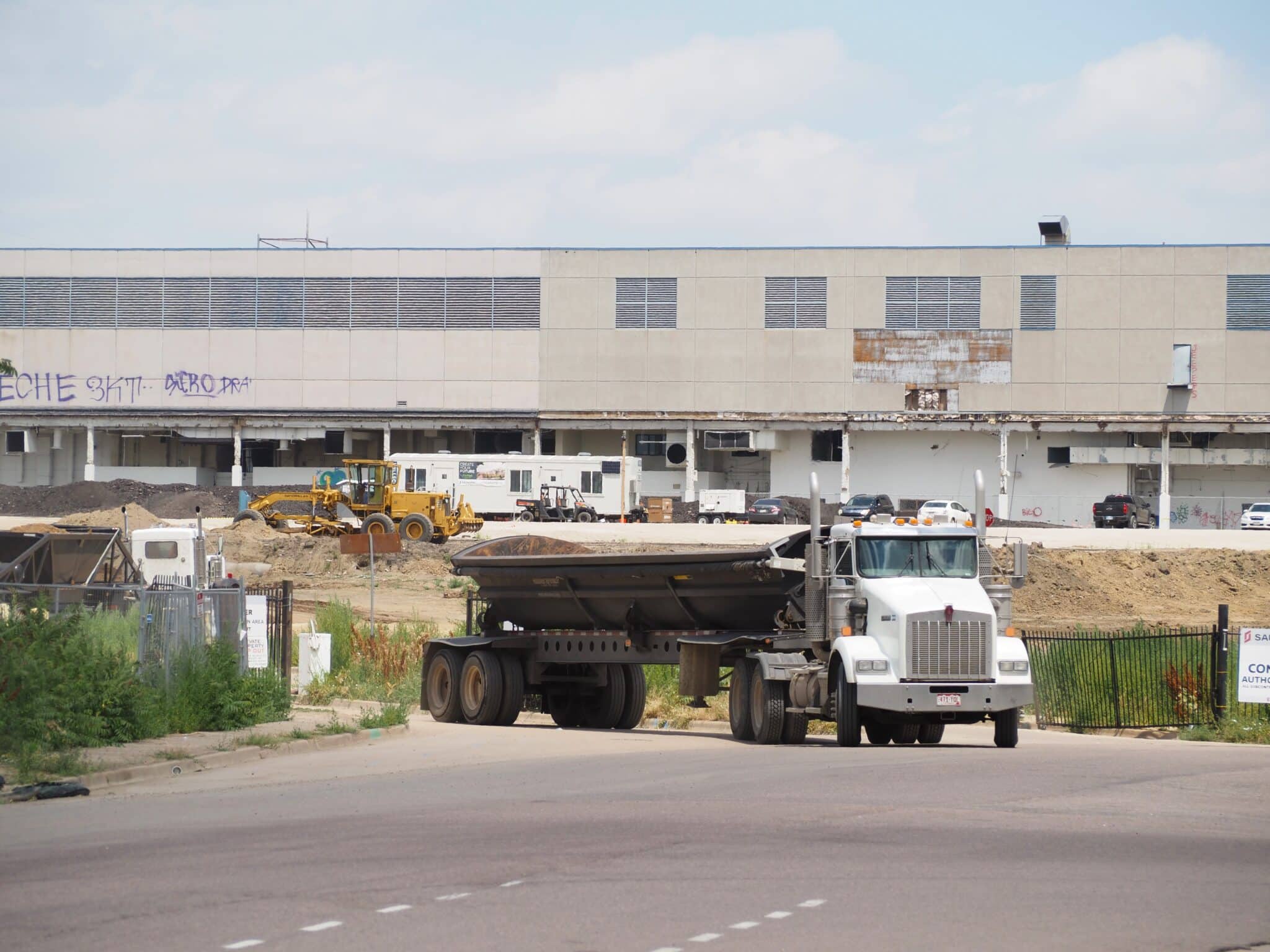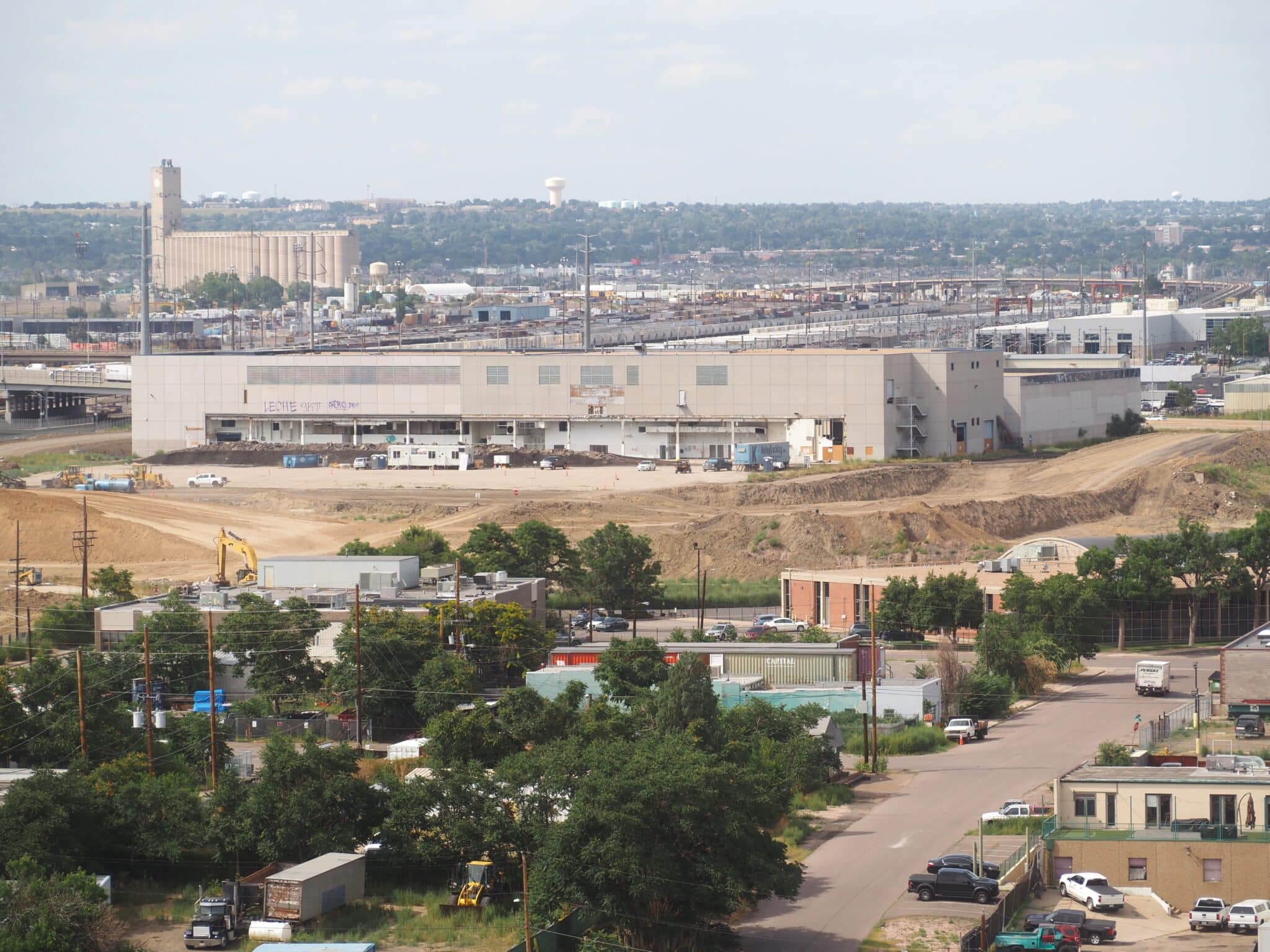
A truck leaves the Fox Park property at the north end of Fox Island. The building was once a printing facility for The Denver Post. (Thomas Gounley/BusinessDen)
Editor’s note: This is the second half of a two-part series. To read Part 1, click the link: “Island tripping: An unusual development restriction limits one pocket of Denver”
You can’t talk about Fox Island without talking about Fox Park.
That’s the name for the development that will replace a former Denver Post printing facility at the north end of the neighborhood, a portion of Globeville surrounded by interstates and railroad tracks, with only two roads in.
The Fox Park property is 41 acres. It comprises more than 20 percent of Fox Island.
Fox Park’s owners, who paid $56.6 million for the Superfund site in 2019, plan a massive mixed-use project. Richard Branson’s Virgin Hotels has said it will open there. A 160,000-square-foot pickleball facility is planned. There will be residences and office space as well.
“It’s at Main and Main,” said Phil Ruschmeyer, a broker involved with deals to build apartments and the hotel, who is also working to lure an upscale restaurant. “It’s the intersection of I-70 and I-25.”
But for Fox Park to be built, something has to change.
The 185-acre Fox Island, which features an RTD rail station, offers developers a hurdle found nowhere else in Denver. Due to the city’s fear of creating gridlock in the neighborhood, new buildings must be awarded a certain number of “trips,” corresponding to how much additional vehicle traffic they’ll prompt.
In 2018, the city limited Fox Island to 25,000 trips, all of which have effectively since been allotted.
The Fox Park project “will by itself exceed the trip capacity,” said Chris Nevitt, Denver’s manager of transit-oriented development.
The trip cap could eventually be increased, or eliminated entirely. But the path Denver has laid out for that to happen depends largely on private developers, like the ones planning Fox Park.
“The city is only half of the formula,” Nevitt said. “We need our private-sector partners.”

A map showing, in gray, the boundaries of Fox Island. The Fox Park property is highlighted in red. (City of Denver/BusinessDen illustration)
The solution
Fox Park is owned by Vita Fox North, a joint venture between Indianapolis-based Pure Development and Mexico City-based Interland.
While future tenants have been announced, nothing is actually under construction right now at Fox Park. Instead, since last September, environmental remediation work has been underway. On a recent Friday, trucks going to and from Fox Park seemed to comprise half the neighborhood’s traffic.
“It’s constant. It’s a steady stream, all day every day,” said Matt Emmons, a Savills broker who has marketed property in Fox Island.
Pure Development executive José Carredano, who moved to Denver to work on Fox Park, said the remediation work is expected to be completed next month, and will result in a “residential-grade cleaned EPA site.” Full buildout of the project will take years.

A rendering of the Fox Park project. (Courtesy Fox Park)
Fox Park has been allotted 7,981 trips — far less than its planned buildings require. But unlike most other property owners in the neighborhood, the joint venture has a clear way to get more trips when it wants them. It can build infrastructure.
Nevitt, the city official, said Fox Park’s ownership has agreed to design and pay for improvements to the “cluster,” his term for the southern entrance to the neighborhood, which includes an on ramp to Interstate 25.
The joint venture has also agreed to design and pay for a bridge from Fox Park across the tracks to 47th Avenue in Sunnyside, which will add a critical third way for vehicles to enter and exit Fox Island, Nevitt said.
Each time Fox Park ownership does something, it will be rewarded with trips. In October 2021, the city published a “Next Steps Study” focused on Fox Island. Fox Park paid for it. The project was rewarded with 1,500 trips.
Fox Park’s owners have known about the trip cap since before they purchased the property.
“It made us step up and understand that big projects need big solutions,” Carredano said.
Another developer has also agreed to fund infrastructure improvements on a smaller scale. Continental Development, an affiliate of Littleton-based Continental Realty Group, owns 3 acres along 38th Avenue at the southwest corner of Fox Park, the spot Home Depot once considered.
Continental plans to build a 425-unit apartment complex with some retail space on the site, which is zoned for up to 20 stories. Twelve percent of units will be restricted to those earning below-average incomes.
The firm has also agreed to pay for establishing the street grid around the property, including extending 39th Avenue on the north and establishing Huron Street on the west of the property.
The effort will also include redesigning and extending Galapago Street, which currently dead ends next to the site, through to 38th Avenue. That will provide another access point to the neighborhood, and result in Continental being given 4,600 trips, which won’t be drawn from the pool of 25,000.
Those improvements will cost tens of millions of dollars. But the developers will have some help from Denver.
The city has approved the use of tax increment financing, or TIF, for both Fox Park and Continental’s project. That will allow the developers to be reimbursed for certain costs — up to $189 million in the case of Fox Park, according to a 2021 presentation to the City Council — by the additional tax revenue generated by the project. Otherwise, the city would have kept the money.
Separately, a metropolitan district has also been established for Fox Park, which allows additional taxes to be levied.
“We’re supporting them,” Nevitt said. “We’re not just saying, ‘Hey, hope you guys deliver.’ We’re all in this together.”

A view of the Fox Park property, as seen from the roof of Assembly Student Living at 3900 Elati St. (Thomas Gounley/BusinessDen)
The future
Counting hypothetical trips may eventually become a thing of the past in Fox Island.
“Our hope is when we get all this stuff done, there will be no need for a trip capacity,” Nevitt said.
But when that will happen, or even when the trip cap will increase from its current 25,000, is unclear. The city rules implemented in 2018 came up for revision this year, as part of a planned review at the five-year market. But the changes made were relatively minor, and the trip cap remained the same, despite the wishes of some.
“I know that many of you were hoping for a re-assessment that would increase the available trips,” Nevitt wrote in a June email to Fox Island property owners. “Unfortunately, not enough has happened to cause such an analysis or to render more trips.”
The trips that Fox Park already has been awarded are enough to start some construction, and the rate of development beyond that could depend on broader economic conditions. That means that how soon its owners revamp the cluster and build the bridge to Sunnyside likely will depend on when Fox Park itself starts to get restricted by the trip cap.
“It is totally dependent on the phases that are taking place on the site,” Carredano said. “It’s more dependent on when you need trips.”

A rendering of the Fox Park project. (Courtesy Fox Park)
Carredano said he knows that not every property owner likes the trip cap — “It’s one more thing that could hinder the upside of the value of the property” — but stressed that it’s a result of a city-run process with multiple public meetings.
“It wasn’t just us with the city,” Carredano said. “It was a big process with the neighbors.”
But the situation means the neighborhood’s smaller players, and the city itself, aren’t really in the driver’s seat.
“We’re just waiting for that infrastructure to be built by other developers. That’s the only light at the end of the tunnel,” said Isiah Salazar of Central Street Capital, believed to be the area’s second-largest property owner.
There’s also questions within the neighborhood about whether the additional trips allowed by new infrastructure will truly benefit all properties. Russell Gruber, a real estate broker who has long worked in the neighborhood, said he’s heard concerns that the trips created by Fox Park-paid work will basically just be given to Fox Park itself.
Nevitt said it’s true that Fox Park will be given priority.
“We believe this is fair – they’re paying to create the trips; they should get the benefit. However, any trips in excess of what Fox Park needs belong to the public and can be assigned to other projects,” Nevitt said, adding other developers are welcome to propose building trip-creating infrastructure.
The broader situation seems perplexing to some, given the city’s desire for more housing, particularly if it’s affordable. Gruber thinks the city should forget the trip count entirely, and just tell developers they can build projects only with little or no parking, given the RTD station is right there.
“I figured the city would be all hands on deck — how do we get developers in here?” Gruber said.
Darrell Watson, the newly elected Denver city councilman who represents the area, brands himself a YIMBY — short for “yes in my backyard” — who believes the city needs to build its way out of what he calls a “housing crisis.” But Fox Island, he said, is a special situation given the limited access points.
“I do not believe we can safely build and expect for residents and consumers and people who recreate over there to get in and out safely,” he said.
The trip cap concept “is a little complex,” Watson said, “but the data behind it is smart.”

A truck leaves the Fox Park property at the north end of Fox Island. The building was once a printing facility for The Denver Post. (Thomas Gounley/BusinessDen)
Editor’s note: This is the second half of a two-part series. To read Part 1, click the link: “Island tripping: An unusual development restriction limits one pocket of Denver”
You can’t talk about Fox Island without talking about Fox Park.
That’s the name for the development that will replace a former Denver Post printing facility at the north end of the neighborhood, a portion of Globeville surrounded by interstates and railroad tracks, with only two roads in.
The Fox Park property is 41 acres. It comprises more than 20 percent of Fox Island.
Fox Park’s owners, who paid $56.6 million for the Superfund site in 2019, plan a massive mixed-use project. Richard Branson’s Virgin Hotels has said it will open there. A 160,000-square-foot pickleball facility is planned. There will be residences and office space as well.
“It’s at Main and Main,” said Phil Ruschmeyer, a broker involved with deals to build apartments and the hotel, who is also working to lure an upscale restaurant. “It’s the intersection of I-70 and I-25.”
But for Fox Park to be built, something has to change.
The 185-acre Fox Island, which features an RTD rail station, offers developers a hurdle found nowhere else in Denver. Due to the city’s fear of creating gridlock in the neighborhood, new buildings must be awarded a certain number of “trips,” corresponding to how much additional vehicle traffic they’ll prompt.
In 2018, the city limited Fox Island to 25,000 trips, all of which have effectively since been allotted.
The Fox Park project “will by itself exceed the trip capacity,” said Chris Nevitt, Denver’s manager of transit-oriented development.
The trip cap could eventually be increased, or eliminated entirely. But the path Denver has laid out for that to happen depends largely on private developers, like the ones planning Fox Park.
“The city is only half of the formula,” Nevitt said. “We need our private-sector partners.”

A map showing, in gray, the boundaries of Fox Island. The Fox Park property is highlighted in red. (City of Denver/BusinessDen illustration)
The solution
Fox Park is owned by Vita Fox North, a joint venture between Indianapolis-based Pure Development and Mexico City-based Interland.
While future tenants have been announced, nothing is actually under construction right now at Fox Park. Instead, since last September, environmental remediation work has been underway. On a recent Friday, trucks going to and from Fox Park seemed to comprise half the neighborhood’s traffic.
“It’s constant. It’s a steady stream, all day every day,” said Matt Emmons, a Savills broker who has marketed property in Fox Island.
Pure Development executive José Carredano, who moved to Denver to work on Fox Park, said the remediation work is expected to be completed next month, and will result in a “residential-grade cleaned EPA site.” Full buildout of the project will take years.

A rendering of the Fox Park project. (Courtesy Fox Park)
Fox Park has been allotted 7,981 trips — far less than its planned buildings require. But unlike most other property owners in the neighborhood, the joint venture has a clear way to get more trips when it wants them. It can build infrastructure.
Nevitt, the city official, said Fox Park’s ownership has agreed to design and pay for improvements to the “cluster,” his term for the southern entrance to the neighborhood, which includes an on ramp to Interstate 25.
The joint venture has also agreed to design and pay for a bridge from Fox Park across the tracks to 47th Avenue in Sunnyside, which will add a critical third way for vehicles to enter and exit Fox Island, Nevitt said.
Each time Fox Park ownership does something, it will be rewarded with trips. In October 2021, the city published a “Next Steps Study” focused on Fox Island. Fox Park paid for it. The project was rewarded with 1,500 trips.
Fox Park’s owners have known about the trip cap since before they purchased the property.
“It made us step up and understand that big projects need big solutions,” Carredano said.
Another developer has also agreed to fund infrastructure improvements on a smaller scale. Continental Development, an affiliate of Littleton-based Continental Realty Group, owns 3 acres along 38th Avenue at the southwest corner of Fox Park, the spot Home Depot once considered.
Continental plans to build a 425-unit apartment complex with some retail space on the site, which is zoned for up to 20 stories. Twelve percent of units will be restricted to those earning below-average incomes.
The firm has also agreed to pay for establishing the street grid around the property, including extending 39th Avenue on the north and establishing Huron Street on the west of the property.
The effort will also include redesigning and extending Galapago Street, which currently dead ends next to the site, through to 38th Avenue. That will provide another access point to the neighborhood, and result in Continental being given 4,600 trips, which won’t be drawn from the pool of 25,000.
Those improvements will cost tens of millions of dollars. But the developers will have some help from Denver.
The city has approved the use of tax increment financing, or TIF, for both Fox Park and Continental’s project. That will allow the developers to be reimbursed for certain costs — up to $189 million in the case of Fox Park, according to a 2021 presentation to the City Council — by the additional tax revenue generated by the project. Otherwise, the city would have kept the money.
Separately, a metropolitan district has also been established for Fox Park, which allows additional taxes to be levied.
“We’re supporting them,” Nevitt said. “We’re not just saying, ‘Hey, hope you guys deliver.’ We’re all in this together.”

A view of the Fox Park property, as seen from the roof of Assembly Student Living at 3900 Elati St. (Thomas Gounley/BusinessDen)
The future
Counting hypothetical trips may eventually become a thing of the past in Fox Island.
“Our hope is when we get all this stuff done, there will be no need for a trip capacity,” Nevitt said.
But when that will happen, or even when the trip cap will increase from its current 25,000, is unclear. The city rules implemented in 2018 came up for revision this year, as part of a planned review at the five-year market. But the changes made were relatively minor, and the trip cap remained the same, despite the wishes of some.
“I know that many of you were hoping for a re-assessment that would increase the available trips,” Nevitt wrote in a June email to Fox Island property owners. “Unfortunately, not enough has happened to cause such an analysis or to render more trips.”
The trips that Fox Park already has been awarded are enough to start some construction, and the rate of development beyond that could depend on broader economic conditions. That means that how soon its owners revamp the cluster and build the bridge to Sunnyside likely will depend on when Fox Park itself starts to get restricted by the trip cap.
“It is totally dependent on the phases that are taking place on the site,” Carredano said. “It’s more dependent on when you need trips.”

A rendering of the Fox Park project. (Courtesy Fox Park)
Carredano said he knows that not every property owner likes the trip cap — “It’s one more thing that could hinder the upside of the value of the property” — but stressed that it’s a result of a city-run process with multiple public meetings.
“It wasn’t just us with the city,” Carredano said. “It was a big process with the neighbors.”
But the situation means the neighborhood’s smaller players, and the city itself, aren’t really in the driver’s seat.
“We’re just waiting for that infrastructure to be built by other developers. That’s the only light at the end of the tunnel,” said Isiah Salazar of Central Street Capital, believed to be the area’s second-largest property owner.
There’s also questions within the neighborhood about whether the additional trips allowed by new infrastructure will truly benefit all properties. Russell Gruber, a real estate broker who has long worked in the neighborhood, said he’s heard concerns that the trips created by Fox Park-paid work will basically just be given to Fox Park itself.
Nevitt said it’s true that Fox Park will be given priority.
“We believe this is fair – they’re paying to create the trips; they should get the benefit. However, any trips in excess of what Fox Park needs belong to the public and can be assigned to other projects,” Nevitt said, adding other developers are welcome to propose building trip-creating infrastructure.
The broader situation seems perplexing to some, given the city’s desire for more housing, particularly if it’s affordable. Gruber thinks the city should forget the trip count entirely, and just tell developers they can build projects only with little or no parking, given the RTD station is right there.
“I figured the city would be all hands on deck — how do we get developers in here?” Gruber said.
Darrell Watson, the newly elected Denver city councilman who represents the area, brands himself a YIMBY — short for “yes in my backyard” — who believes the city needs to build its way out of what he calls a “housing crisis.” But Fox Island, he said, is a special situation given the limited access points.
“I do not believe we can safely build and expect for residents and consumers and people who recreate over there to get in and out safely,” he said.
The trip cap concept “is a little complex,” Watson said, “but the data behind it is smart.”
